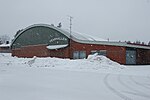Sem Municipality
1838 establishments in Norway1988 disestablishments in NorwayFormer municipalities of NorwayTønsberg

Sem is a former municipality in Vestfold county, Norway. The 102-square-kilometre (39 sq mi) municipality existed from 1838 until its dissolution in 1988. The area is now part of Tønsberg Municipality. The administrative centre was the village of Semsbyen. Other villages in Sem included Barkåker, Eik, Husvik, Husøy, Ringshaug, and Tolvsrød.
Excerpt from the Wikipedia article Sem Municipality (License: CC BY-SA 3.0, Authors, Images).Sem Municipality
Semsbyveien, Tønsberg
Geographical coordinates (GPS) Address Nearby Places Show on map
Geographical coordinates (GPS)
| Latitude | Longitude |
|---|---|
| N 59.2823 ° | E 10.33004 ° |
Address
Semsbyveien 82E
3170 Tønsberg
Norway
Open on Google Maps









